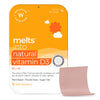Ever feel like no matter how much you rest, you're still exhausted? Or maybe your mood's been off, and your muscles ache without reason. While it's easy to blame stress or poor sleep, these could actually be signs of something deeper, specifically Vitamin D deficiency or Vitamin B12 deficiency. And the truth is, the signs aren’t always obvious.
Let’s break down the real, everyday symptoms of vitamin d3 and b12 deficiency, and what you can do about them.
Understanding the Importance of Vitamin D3 and B12
Before diving into the symptoms, here’s a quick refresher:
-
Vitamin D3 (often called the sunshine vitamin) helps your body absorb calcium, supports your immune system, and contributes to muscle and bone health. [NIH] Your body makes it naturally through sunlight, but many of us don’t get enough exposure, especially if we work indoors or live in polluted cities.
-
Vitamin B12, on the other hand, supports nerve function, red blood cell production, and brain health. [NIH] It’s mostly found in animal-based foods, which puts vegetarians and vegans at higher risk of a deficiency.
Spotting the Symptoms of Vitamin D3 Deficiency
Symptoms of low Vitamin D3 may show up in subtle ways. Here’s what to look out for:
1. Persistent Fatigue
Vitamin D3 is involved in mitochondrial function, which affects how your body generates energy. Feeling tired all the time, even with adequate sleep, could be linked to low vitamin D.
2. Muscle Pain and Weakness
Muscle cramps, joint aches, or general body soreness may signal vitamin D3 deficiency. This is especially common in older adults or those who rarely get sun exposure.
3. Mood Swings and Mild Depression
One of the often-missed symptoms of Vitamin D deficiency is a noticeable shift in mood. Low D3 levels have been linked to increased risk of depression and irritability, due to its role in serotonin production.
4. Frequent Colds or Illnesses
If you seem to catch every seasonal bug, your immune system might be compromised. This is a lesser known but critical symptom of deficiency of Vitamin D.
Symptoms of Deficiency in Vitamin B12
Here’s what to watch for if your body is low on B12:
1. Tingling Hands or Feet
One of the most distinct symptoms of low Vitamin B12 is a tingling or pins-and-needles sensation in your extremities, caused by nerve damage due to prolonged deficiency.
2. Pale or Yellowish Skin
B12 deficiency affects red blood cell production, leading to a type of anemia that can leave your skin looking unusually pale or slightly jaundiced.
3. Brain Fog or Memory Issues
Forgetfulness, difficulty concentrating, or a “cloudy” mind can be triggered by low B12 levels, especially in adults over 50 or those with gut absorption issues.
4. Dizziness or Shortness of Breath
You may feel winded even with minor exertion. That’s because fewer red blood cells mean less oxygen is getting to your tissues.
5. Mouth Ulcers or a Swollen Tongue
This lesser-known but uncomfortable sign often shows up when a B12 deficiency becomes more severe.
Why Vitamin d3 and b12 Deficiency is on the Rise
Modern living is making symptoms of low vitamin D and B12 increasingly common. Indoor work culture, less time in natural light, and the growing shift to plant-based diets all contribute. Digestive issues, chronic stress, and aging further reduce absorption of these key nutrients.
What You Can Do About It
If you’ve noticed several of the signs above or vitamin D and B12 deficiency symptoms together, don’t brush them off. Here’s how to support your levels:
-
Get tested: A simple blood test can confirm if you're dealing with a vitamin D deficiency or low B12 levels.
-
Soak up the sun: Spend at least 15–20 minutes in natural morning sunlight daily, if possible.
-
Improve your diet: Add fortified foods, eggs, dairy, and fish for Vitamin D. For B12, animal products or fortified plant-based alternatives can help.
-
Consider supplements: Talk to your doctor about high-quality Vitamin D3 and B12 supplements if diet and sun exposure aren’t enough.
Final Thoughts
Your body doesn’t shout—it whispers. Those gentle nudges like fatigue, brain fog, or sore muscles could be more than just daily wear and tear. Catching the symptoms of Vitamin D3 deficiency, or symptoms of Vitamin B12 deficiency early can transform how you feel every day.
So the next time you feel "off," don’t just push through. Listen to your body—it may be time to replenish what’s missing.
FAQs
1. What is the fastest way to correct a B12 deficiency?
Taking high-quality B12 supplements and consuming B12-rich or fortified foods can help correct the deficiency quickly. Always consult your doctor for the right dosage.
2. Can vitamin D and B12 deficiencies be linked?
Yes, they can co-exist due to shared risk factors like poor diet, limited sun exposure, aging, or absorption issues, making it important to monitor both.
3. How can I raise my vitamin D levels quickly?
Spend 15–20 minutes in morning sunlight daily and include vitamin D-rich foods like eggs and fish. Supplements can also help if natural sources aren't enough.
4. What is the fastest way to fix B12 deficiency?
A combination of B12 supplements and dietary changes—like adding animal products or fortified plant-based foods—can restore levels quickly with medical guidance.
5. What is the most common cause of B12 deficiency?
The most common cause is a lack of dietary intake, especially in vegetarians and vegans. Poor absorption due to gut issues also plays a major role.
6. Can vitamin B12 deficiency be a sign of cancer?
While B12 deficiency isn’t usually a sign of cancer, prolonged deficiency causing severe anemia or neurological symptoms should be evaluated by a healthcare provider.
7. Are vitamin D and B12 deficiency linked?
Yes, they’re often linked due to similar lifestyle and dietary habits that limit sun exposure and nutrient intake, especially in modern, urban lifestyles.
8. How can I raise my vitamin D level quickly?
Get regular sun exposure, eat vitamin D-rich foods like fatty fish or fortified dairy, and consider D3 supplements for faster correction with your doctor’s advice.
9. What is vitamin D good for?
Vitamin D plays an important role in supporting bone health by aiding calcium absorption. It also helps strengthen immunity, regulate mood, and support overall energy levels. A deficiency of vitamin D can lead to fatigue, muscle weakness, low immunity, and mood swings.
































